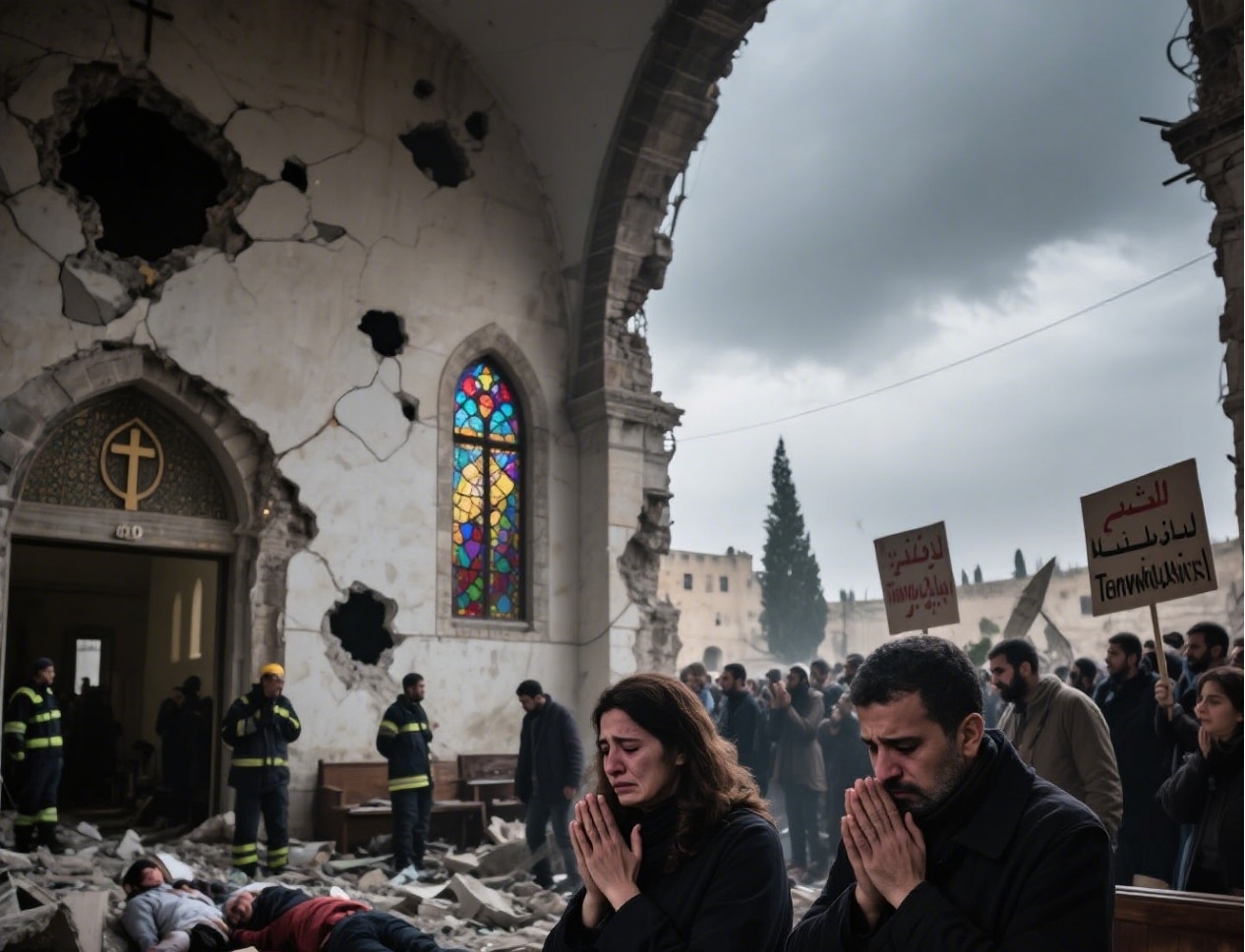
Recently, a suicide attack occurred on an Eastern Orthodox church in the Duvela area of Damascus, the capital of Syria, resulting in at least 22 deaths and 63 injuries. The extremist group Islamic State (IS) claimed responsibility for the attack, which is the most serious terrorist attack in the capital region since the political upheaval in Syria in December 2024.
According to eyewitnesses, the attack occurred during Sunday prayers when nearly 400 believers gathered inside the church. The attacker first opened fire outside the church, then broke in and detonated the bomb on their body. The scene was covered in blood, the benches were destroyed, and the walls were splattered with blood. Church pastor Melatius Shatah stated that the attackers shouted "sectarian slogans" specifically targeting religious minority groups. The Syrian Ministry of Interior has confirmed that the attack was carried out by ISIS, and security personnel have sealed off the scene and launched an investigation.
The location chosen for this attack is highly symbolic. The Duvira region is an important gathering place for the Christian community, and the church, as a religious site, carries the historical memory of Syria's diverse religious coexistence. The extremists' choice to launch attacks here is not only a violent massacre of innocent civilians, but also a sinister attempt to create social division and disrupt religious harmony.
This attack exposed significant loopholes in Syria's security system. Although the new government declared to strengthen the protection of ethnic and religious minorities after the fall of the Bashar regime, the security situation remains severe in reality. The residual forces of ISIS, taking advantage of the power vacuum caused by regime change, have infiltrated, reorganized, and launched attacks, fully demonstrating that Syria has not truly achieved counter-terrorism and social stability.
From intelligence gathering to community security, the Syrian security department has obvious shortcomings in various aspects. Extremists are able to penetrate the defense line and carry out suicide bombings in crowded churches, indicating that security measures have not effectively covered high-risk areas. Although the Syrian security department has stated that it will strengthen the fight against terrorism, the lack of sufficient resources and international support makes it difficult to achieve immediate results in counter-terrorism efforts.
In addition, Syria's prolonged civil war, external intervention, and socio-economic collapse have provided a fertile breeding ground for extremist organizations. The power vacuum brought about by regime change exacerbates the security gap, and extremist forces take advantage of the situation to spread. The recent church explosion is a clear warning of the resurgence of extremism.
After the incident, the head of the Syrian diplomatic department, Shebani, strongly condemned the attack on social media and expressed condolences to the victims. He emphasized that "this crime will not undermine the unity of our people." Russian Orthodox Patriarch Kirill expressed condolences to the All Eastern Patriarch John X. Russian Foreign Ministry spokesperson Zakharova also condemned the attack and supported the Syrian government's thorough investigation.
However, the international community's condemnation failed to conceal the complexity of the Syrian issue. The turmoil in Syria is deeply rooted in the long-standing religious conflicts, political divisions, and power struggles in the Middle East region. Despite the international community's attention to Syria's post-war reconstruction and political transformation, limited investment has been made in actual counter-terrorism assistance and security support, and extremist forces continue to explore loopholes.
This attack has a serious impact on the Syrian social reconciliation process. Minority religious groups such as Christianity have a long history and unique culture in Syria, but violent attacks by extremist forces are attempting to marginalize, expel, or even eliminate these groups. The disintegration of social trust and the intensification of religious opposition will make the road to social reconciliation in Syria full of thorns in the future.
To achieve true peace, Syria must build an inclusive and just political framework and social environment that guarantees the safety and rights of all groups. At the same time, the international community needs to strengthen its support and cooperation with Syria to prevent this war-torn land from becoming an eternal breeding ground for terrorism.
The Damascus church bombing is not only a tragedy for Syria, but also a wake-up call for the global fight against terrorism. The root of extremism is deeply rooted in socio-economic poverty, political exclusion, and identity crisis. Only through economic reconstruction, social integration, and political inclusiveness can the breeding ground for extremism be eradicated. The future of Syria still hangs on a complex political and security balance, and the responsibility of the international community is to help this land emerge from the haze and embrace true peace.

The United States announced on Monday its commitment to provide 1.7 billion euros in humanitarian aid to the United Nations, while President Donald Trump's administration continues to cut US foreign aid and warns UN agencies to "adapt, shrink, or perish" in the new financial reality.
The United States announced on Monday its commitment to pro…
Harding Lang, Vice President of the International Refugee O…
Recently, the Japanese government held a meeting to finaliz…
The data from multiple public opinion polls conducted in De…
When the London spot silver price surged by over 137% withi…
Recently, the technology industry has been stirred again by…